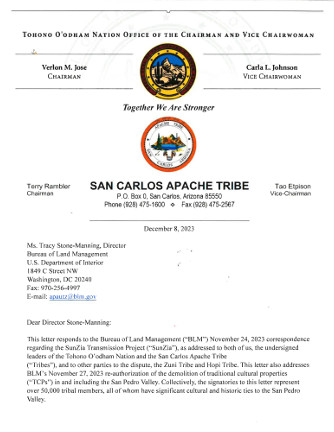
“Regrettably, with the SunZia project we appear to be, once again, in a situation whereby BLM refuses to protect the Tribes’ interests, the environment, and TCPs in order to boost corporate profits.
We had hoped that BLM would heed our declarations on the cultural and historical importance of the San Pedro Valley.
We expected BLM to read and act upon the relevant scientific literature-some of which is authored by Interior Department officials-documenting the more than 12,000 years of connectivity among our peoples and the Valley.
We thought it obvious that BLM would see the error in its reliance on archaeological consultants, who know little about our lands and cultures, to identify and document places at the core of our histories, religions, and identities.
We trusted that BLM would delay completion of the National Environmental Policy Act (“NEPA”) process until it completed the most important step in the National Historic Preservation Act (“NHPA”) process, that is, the identification of historic properties.
We advised with BLM to conduct a cultural landscape study to complement the archaeological survey, thereby providing the context for assessing the significance of and protecting TCPs.
We asked BLM to follow the NEPA regulations and acknowledge the obvious truth that the proposed addition, in 2020, of hundreds of miles of new roads to the SunZia project and the proposed change to its purpose from a tandem line (one alternating current, one direct) to a single direct current line, mandated re-analysis of the substantially changed SunZia project.
We relied on BLM to adhere to the NHPA definition of consultation, as ‘the process of seeking, discussing, and considering the views of other participants, and, where feasible, seeking agreement with them’.
We sought, and still seek, to engage in meaningful consultation with BLM, as opposed to the tightly scripted meetings led by BLM archaeologists charged with expediting compliance checklists and permit issuance. However, to be meaningful, consultation is not a listening exercise; instead, it is one of a meaningful response that acts on our concerns.” — Verlon Jose, Chaiman Tohono O’Odham Nation and Terry Rambler, Chairman San Carlos Apache Tribe.